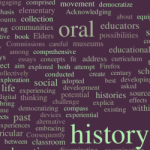 Edited by Dr. Kristina R. Llewellyn and Dr. Nicholas Ng-A-Fook.
Edited by Dr. Kristina R. Llewellyn and Dr. Nicholas Ng-A-Fook.
Deadline for Abstracts: September 30th, 2014.
Deadline for Full Submissions: March 1st, 2015.
This collection will address oral history as a “best practice” for researching and engaging the past with students. The aim of this collection is to provide educators, students, and researchers with a comprehensive examination of the curricular innovations and pedagogical possibilities of oral history within formal and informal educational settings.
This collection will address oral history as a “best practice” for researching and engaging the past with students. The aim of this collection is to provide educators, students, and researchers with a comprehensive examination of the curricular innovations and pedagogical possibilities of oral history within formal and informal educational settings.
The value of oral history is now a well-established educational praxis within Indigenous communities. Elders tell stories about the past in order to teach younger generations how to understand the world today and tomorrow. Acknowledging its pedagogical values, along with the rise of social history, schools adopted oral history to bring eyewitness accounts of the past to life for students. Most notably, The Firefox Project, comprised of students at Rabun Gap-Nacoochee School, conducted life histories with Southern Appalachian elders. Since this initial school-based project, oral tradition, testimony, and life histories have become an integral part of educational programming, from elementary schools to museums. Yet, oral history has been neither an explicit nor a common curricular objective or pedagogical method. With shifting emphasis on concepts like historical literacy, thinking, and inquiry, the curricular focus for the 21st century classroom has changed. History teachers are now asked to create pedagogical spaces that attempt to understand our individual and collective lived experiences with the past as a critical compass for interpreting both the possibilities and limitations of our “nation-state’s” social development (e.g. Truth and Reconciliation Commissions). It is also widely acknowledged that the process of recording, preserving, and disseminating our understandings of the past through life narratives makes history more experiential and inclusive for learners. Consequently, educators are embracing oral history methods and sources to join what is now global social movement to democratize history. Educators, from elementary schools to universities, are increasingly equipping their students with digital devices to record the lives of people in their communities. They are also increasingly drawing upon existing oral history sources, including from veterans and Holocaust survivors, to better understand the legacy of political injustices.
While oral history is experiencing resurgence in education, there has been limited interrogation of what this movement means internationally for history education and for history educators. Some of the questions that need to be explored include: Where does oral history fit within the history curriculum? What does it mean to ‘do’ oral history in today’s classroom or alternative education forums (e.g. NGOs or museums)? Does oral history challenge traditional pedagogy, and, if so, how? In what ways do oral history methods support social justice-oriented education? In what ways does oral history address historical thinking? What are the relationships among doing oral history and developing one’s historical consciousness? What are the effects and affects of a growing use of oral histories for education? Without careful examination of these questions, the rich, democratizing potential of oral history for education remains pedagogically, politically, and socially restricting. Therefore, our hope is that the essays put forth in this book will collectively seek to uncover this potential through a critical exploration of the relationship between oral history and education.
Topics may include, but are not limited to, the following areas of research:
- The history of oral history in public education;
- Theoretical frameworks for oral history as an educational praxis;
- Methodological innovations in oral history teaching or learning;
- Implications of oral history for and within curriculum policy;
- The role of oral history for social justice-oriented learning (e.g. citizenship education, peace education; human rights education; anti-racist education; indigenous education; feminist education);
- Pedagogical approaches to oral history in schools;
- The relationship of oral history and historical consciousness;
- Oral history and the development of historical thinking skills.
Submission Guidelines
We welcome both theoretical and empirical papers from contributors working on the role of oral history in teaching and learning within formal and informal educational settings (e.g. academics, teachers, public historians, and museum curators). The working language of the collection will be English.
Deadline for Abstracts: September 30th, 2014
Content: 300-500 words abstract with title, author’s name, a short bio with affiliation, and contact information.
Invitations to submit a full paper will be sent to selected authors by October 30th, 2014.
Deadline for Full Draft Submissions: March 1st, 2015
Full papers should be between 5500-7000 words, including endnotes.
Final acceptance is conditional upon peer-review assessments.
Authors will be invited to a workshop for the collection during the International Association for the Advancement of Curriculum Studies from May 26-29, 2015 at the University of Ottawa.
The final papers, inclusive of revisions following peer-review, will be due in the fall of 2015. The anticipated publication date for the collection is the fall of 2016.
Please send proposals to Dr. Kristina R. Llewellyn: kristina.llewellyn@uwaterloo.ca AND Dr. Nicholas Ng-A-Fook: nngafook@uottawa.ca.
